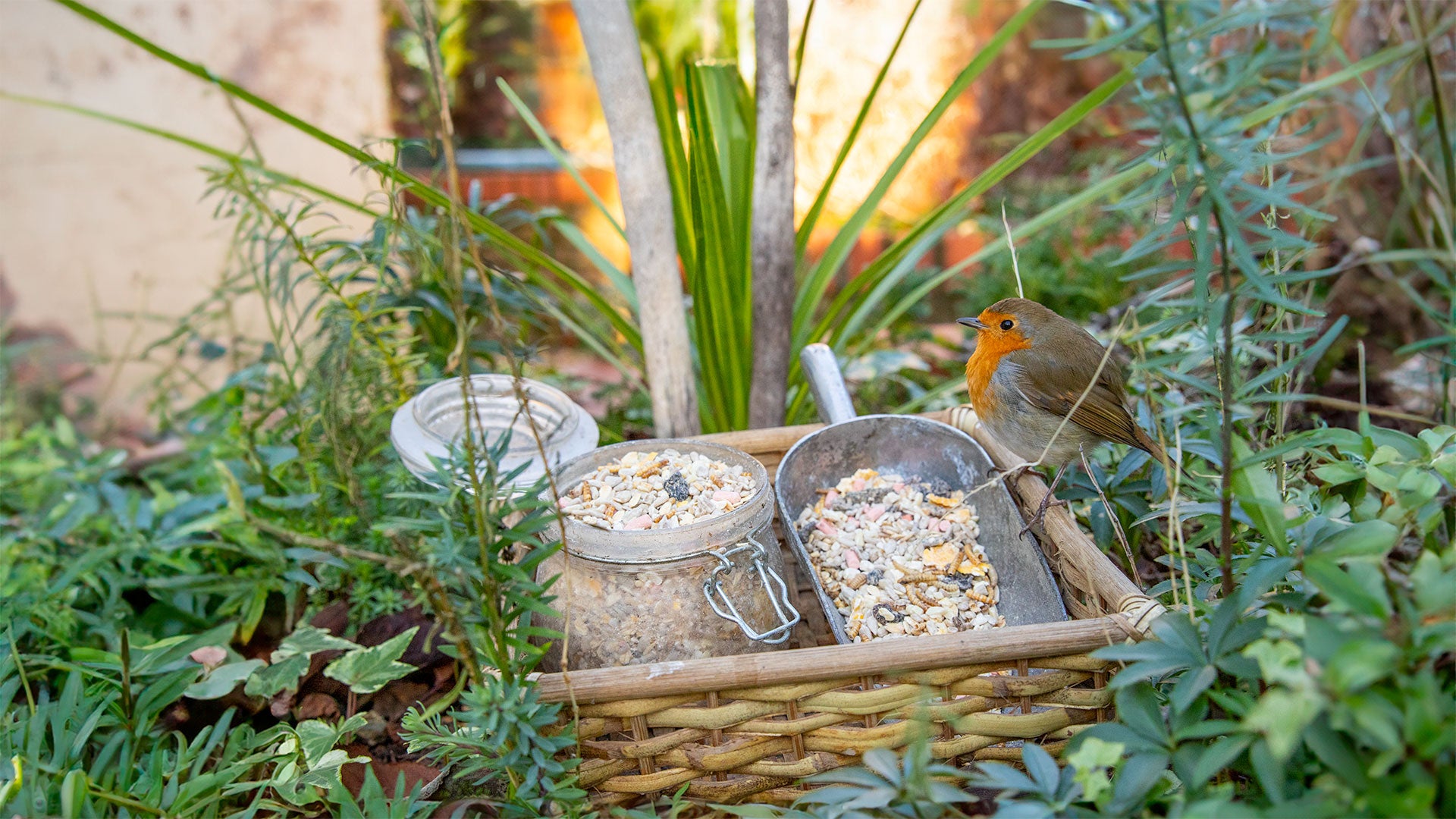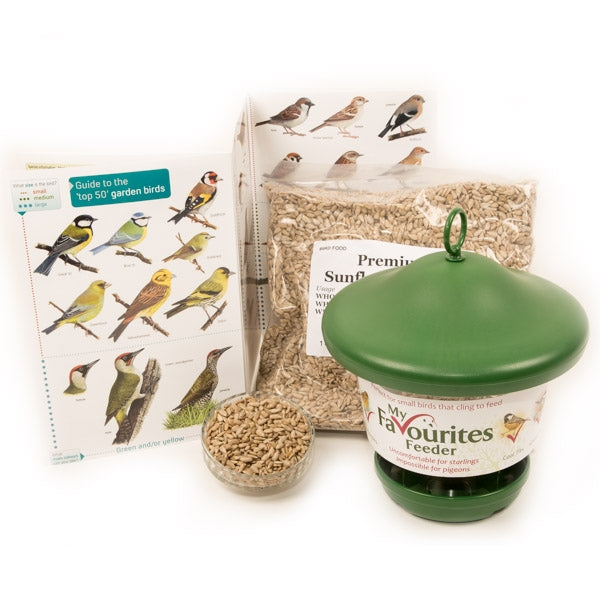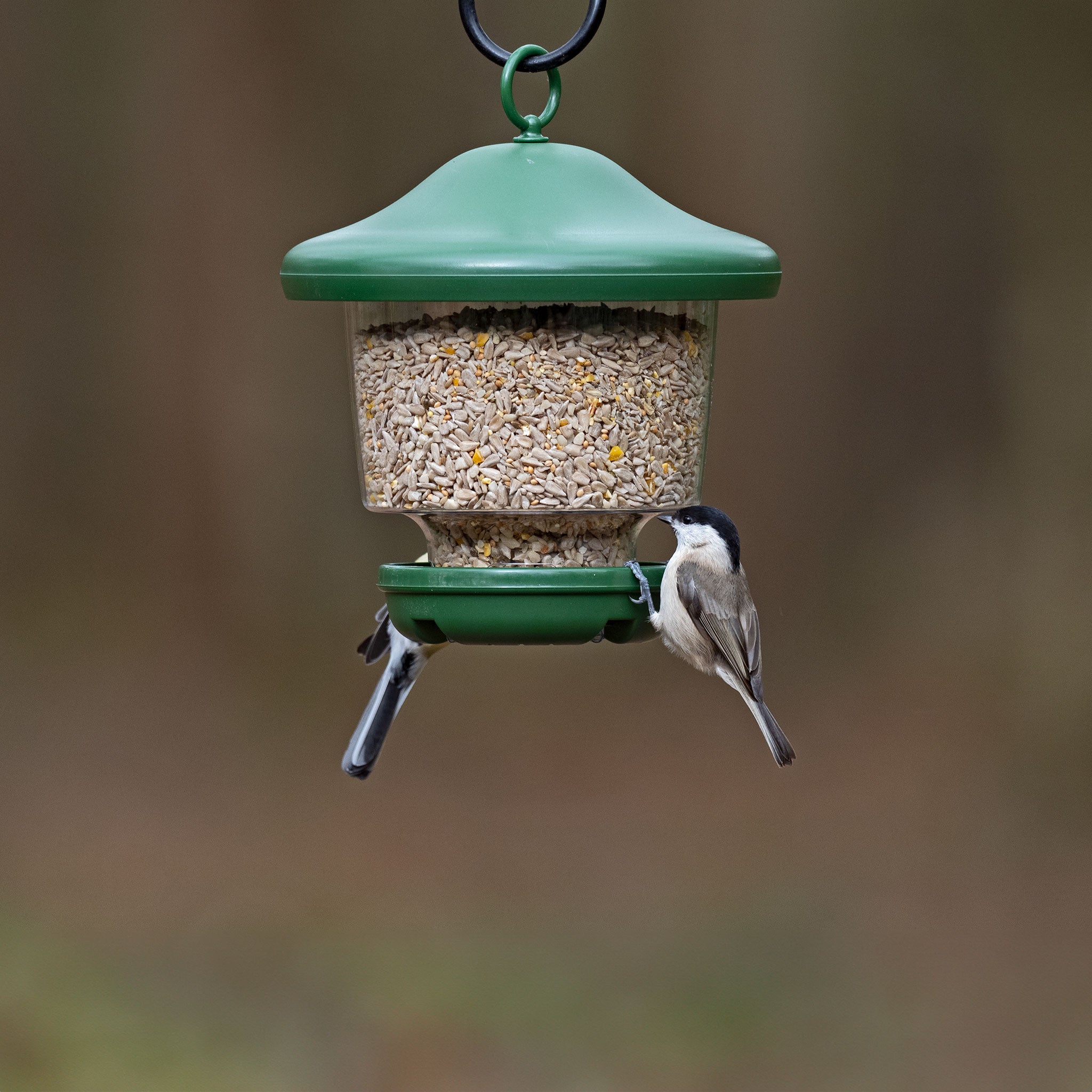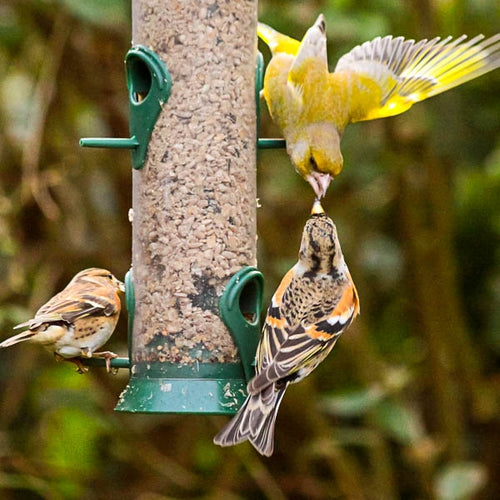Bird Food for Every Season
Feeding birds is one of the simplest, most rewarding ways to connect with nature and it matters every day of the year. From frosty winter mornings to the high heat of summer, garden birds face seasonal challenges. That’s where we come in.
At Ark Wildlife, we offer the best overall bird food for every season, species, and situation. Whether you’re just starting out or you've been feeding birds for years, our expertly balanced blends and species-specific foods help support wildlife at every stage.
The Joy of Bird Feeding
There’s a quiet magic in feeding birds. One moment your garden is still, and the next, a burst of wings and colour fills the air. A chattering charm of goldfinches, the flash of a blue tit, or the determined hop of a robin on the lawn, all these moments bring a sense of wonder, even on an ordinary day.
Bird feeding transforms gardens into living, breathing spaces. It invites nature to come closer, and rewards us with daily displays of beauty, curiosity, and song. Every visitor to the feeder becomes a familiar presence, adding life and movement to our outdoor spaces.
Whether you're sipping tea on the patio or watching from a window, feeding birds offers instant connection to the wild. It’s not just food… it’s friendship.
Why feed birds year round?
Many people start feeding birds in winter, when natural food sources are scarce. But the truth is, birds benefit from supplemental feeding all year long.
In spring, they need protein for nesting and raising young. In summer, fledglings and moulting adults rely on soft, nutritious foods. Autumn is a time to build fat reserves, while winter demands calorie rich seeds and fats just to survive.
By feeding birds year round, you're giving them the consistent, dependable support they need to thrive. And in return? You get a garden filled with song, colour, and life.
What is the best overall bird food?
If you're looking for one go-to blend that does it all, choose our exceptional no-mess, no-waste Hearty™ seed mixes. These are ideal for year round feeding and attract the widest possible variety of species and in ever greater numbers, including:
- Blue tits, great tits, coal tits, long-tailed tits
- House sparrows, robins, blackbirds, dunnocks
Finches, siskins, nuthatches, woodpeckers
Our Hearty™ mixes include a high percentage of sunflower hearts, millet, suet pellets or dried mealworms, with no cheap fillers like wheat or barley, which often go uneaten. Our Ark Premium No Mess Feeder Mix is designed to offer maximum nutrition with zero waste, making it the best overall bird food for busy gardens.
You can also supplement with species-specific foods like:
- Mealworms for robins and blackbirds
- Niger seed for goldfinches
- Suet blocks for energy-loving woodpeckers and tits
What is the best bird seed to feed birds in spring and summer?
In spring and summer, birds need energy to nest, feed their young, and undergo moulting. During this time, offer:
- High-protein foods such as live or dried mealworms
- Sunflower hearts easy to eat and full of energy having the shells removed
- Suet pellets and blocks made with fat offering tasty fast energy
- Insect rich blends to support fledglings
Avoid large, hard seeds or whole peanuts, as these can present a chocking hazard for young and inexperienced chicks, fledglings and birds.
Our Ark Summer Support Mix is specially created to support birds during warmer months, offering bite-sized, easily digestible protein and calcium rich nutrition. It's gentle on young beaks and packed with what they need most.
Why should you feed birds in the summer?
You might wonder, "should you feed birds in the summer?" The answer is a confident yes, but with care.
Summer brings long days, but it also brings drought, heat stress, and a hungry new generation of birds. Natural food like insects and berries may be abundant one week and vanish the next due to changes in the weather.
Tips why feeding birds in summer is important:
- Supports fledglings still learning to forage
- Helps adults recovering from the rigours of nesting
- Offers clean, consistent food when wild supplies dip
- Maintains the joy of birds visiting your garden, and your feeders
Clean feeders regularly, especially in warm or wet weather, and ensure fresh water for drinking and bathing is available every day.
Is there a time you should stop feeding birds in summer?
There’s a common myth that feeding birds in summer stops them from finding natural food. But in the UK the RSPB say there's no need to stop feeding birds in summer, and it continues to be beneficial as long as you:
- Clean feeders weekly to prevent the spread of disease in warm weather
- Offer soft, small seeds and mealworms safe for chicks
- Avoid large, dry foods like whole peanuts or uncooked fat
In short, adapt your feeding, use better quality bird food but don't stop it. Summer is just as important as winter when it comes to helping garden birds stay healthy.
Feeding in autumn and winter
As days shorten and temperatures drop, birds need calorie rich food to survive. Start increasing your feeding in autumn so birds know where to find food when they need it most.
Choose:
- Fat balls and suet blocks for warmth and energy
- Peanuts and sunflower seeds to build reserves
- Mealworms and raisins for thrushes and robins
While autumn may see a lull in visiting birds due to many common garden species going through the moult. There will also be a period of abundance of natural seeds and fruit. Weeks can go by with little or no activity on bird feeders. However, it’s important to keep feeding as this abundance can be short lived and birds will return in ever greater numbers and the days shorten, and cool.
Winter feeding brings the greatest variety of species to your garden, including less seen birds like redwings and fieldfares. Keep feeders stocked up, and you’ll be rewarded with a daily display of colour and activity.
Why high quality bird food matters
Not all bird food is equal. Cheap mixes often from supermarkets and garden centres often include large quantities of wheat, split peas, or barley, all cheap ingredients and fillers that offer little nutritional value and birds don’t eat. All it does is discourage birds from visiting and grow into weeds under your feeders.
The best high quality bird food:
- Reduces waste
- Provides better nutrition
- Keeps your feeders cleaner
- Attracts a wider range and numbers of birds
When you invest in food that's designed for the needs of UK species, you're helping birds live longer, breed more successfully, and return to your garden again and again.
At Ark Wildlife, all our mixes are tested and trusted by wildlife experts and independently tested. We don’t include cheap fillers, and we never compromise on quality.
The mental and physical health benefits of feeding birds
Bird feeding doesn’t just help wildlife, it helps us too. Watching birds brings a calming rhythm to daily life. Their songs, colours, and behaviours draw us out of our heads and into the moment.
Studies show that regular interaction with nature, even something as small as watching birds at a feeder, can:
- Reduce stress and anxiety
- Improve mood and focus
- Lower blood pressure
- Encourage time spent outdoors
Bird feeding can become a daily ritual, a quiet act of care that reconnects us with the seasons. For older adults or people working from home, it offers routine, connection, and joy, small, uplifting moments that add up to a happier, healthier you.
It’s a simple act that nourishes both garden wildlife and the human spirit.
What to put in your feeders (and when)
Spring/Summer
- Mealworms (live or dried)
- Sunflower hearts
- Ark Hearty™ Seed Mixes
- Insect-rich suet pellets
Autumn/Winter
- Fat balls and suet blocks
- Peanuts (in mesh feeders)
- Ark Winter Warmer Mix
Year-Round
- Premium seed mixes
- No mess & Hearty™ seed mixes
- Suet pellets and blocks
- Water for drinking and bathing
Every feeder filled is an invitation to wildlife. Whether you hang a single seed feeder or set up a full tiered feeding station, you’re creating a lifeline for birds in every season.
Support your local wildlife with the best bird food in summer, winter, and every season between. With Ark Wildlife, feeding birds is more than a hobby, it’s a simple, powerful way to help nature thrive in your own back garden.








